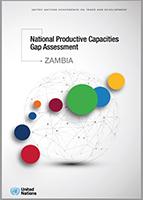
Zambia belongs to the least developed countries’ (LDCs) and landlocked developing countries’ (LLDCs) groups.
The country has made modest socioeconomic progress in some areas, but still exhibits many of the challenges afflicting LDCs in general.
Zambia’s economy remains significantly dependent on the mining and export of copper.
The high dependence on extractives has left the economy vulnerable to fluctuations in the copper price for most of its postcolonial history, and highly exposed to external shocks such as the COVID-19 pandemic.
Zambia’s economy is furthermore characterized by weak productive capacities and lack of structural economic transformation.
UNCTAD prepares National Productive Capacities Gap Assessments (NPCGA) to provide support to graduating LDCs following the inclusion of the Productive Capacities Index (PCI) in the graduation monitoring process by the UN Committee for Development Policy (CDP) and UN General Assembly resolutions requesting UN entities to provide support to graduating LDCs in view of developing their smooth transition strategies.
The PCI provides the statistical foundations for NPCGA analyses, relying on eight categories to measure different elements of productive capacities.
The PCI together with a closer examination of micro and macroeconomic fundamentals of the country as well as an assessment of visions and development plans form the basis of the NPCGA for Zambia. The NPCGA closely examines Zambia’s socioeconomic challenges, opportunities, and prospects.
It identifies comparative advantages of the country and key binding constraints to socioeconomic development.
It recommends a series of pragmatic and forward-looking policy actions at domestic level together with international support measures (ISMs) aimed at fostering productive capacities and achieving structural economic transformation.
The ultimate objective of NPCGA is to enable Zambia to graduate with momentum from the LDC category and to realize its ambition to become a prosperous middle-income nation by 2030.


